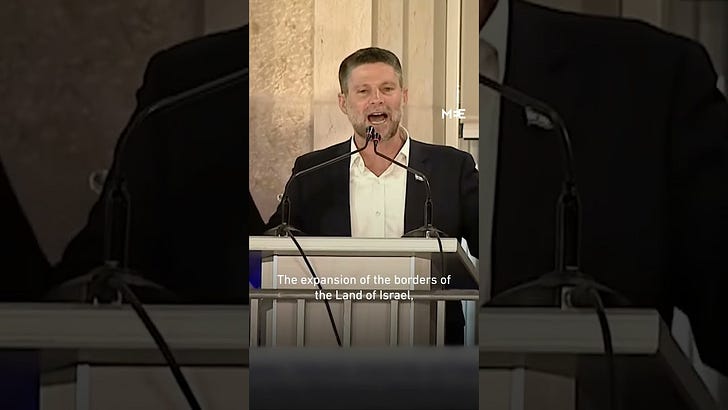Would Regime Change Lead Iran to Make Peace with Israel?
Or, is Israel capable of even imagining peace with rather than domination of its neighbors?
1American and Israeli officials and their backers who imagine that the U.S.-Israeli bombing campaign against Iran and its regional allies will clear the way for a comprehensive regional peace through the Abraham Accords are deceiving themselves. Even if the weakening of the Islamic Republic of Iran opens the door to regime change, a new Iranian government would not join the Abraham Accords without concessions to Palestinian national rights that the government of Israel has not just opposed, but declared illegal and, in Israeli terms, unconstitutional. A regional agreement on peace and security requires regime change in Israel too.
Political change in Iran could take various forms:
· A takeover by the most hardline elements of the Islamic Revolutionary Guard Corps that would eliminate even the “reformist” trend tolerated by the regime, currently represented by President Pezeshkian and former Vice President and foreign minister Javad Zarif;
· A change in leadership within the Islamic Republic, possibly leading to reformist elements taking charge. This could happen due to a succession battle after the passing of the 86-year-old supreme leader, Ayatollah Ali Khamenei, with support from pragmatic members of the security forces.
· The empowerment of reformists allied with the street power of the anti-regime opposition; or
· A revolution comparable in scope to the Islamic Revolution of 1979 that completely replaced the regime.
The latter is the least likely. Whatever the outcome, there would be no place in Iran for Reza Pahlavi, the son of the former Shah, or the Mujahedin-e Khalq (MEK), which has been supported by Saddam Hussein and some American politicians, and was formerly listed as a Foreign Terrorist Organization by the U.S. State Department.
Each of the scenarios but the first would lead to some moderation or change of Iran’s position toward Israel. There is what we might call an anti-anti-Israel current among opponents of the regime and some resentment of the Palestinians for supposedly benefiting from the regime’s largesse while the population suffered under sanctions. But Israel’s attacks on targets unrelated to the nuclear program, which cause hundreds of civilian casualties, have generated popular resentment, even hatred, of Israel. Among the 71 people killed by Israel in the bombing of Evin prison, where many Iranian opposition activists have been jailed, were at least two inmates. Even the most militant opponents of the Islamic Republic would not reach an accommodation with a State of Israel that continued the massacre and expulsion of Palestinians and imposed Jewish supremacy over the entire territory of Palestine. The opposition’s solidarity with Palestinians should not be confused with support for the current regime’s eliminationist rhetoric, but any new government would most likely be unwilling to realign with the U.S. and Israel.
Furthermore, no domestic political change will alter Iran’s geopolitical position. Iran will not take a more pro-Israeli position than Saudi Arabia, ruled by Crown Prince (and eventually King) Muhammad Bin Salman. Saudi Arabia will not move from its position insisting on “concrete steps” toward a Palestinian state as a condition for recognition of Israel, and Iran under any future government will not take a position on Palestine weaker than that of a U.S.-allied Saudi Arabia. Regardless of the political orientation of any future Iranian government, it will retain what even opponents see as the main accomplishment of the Iranian revolution: Iran’s strategic independence from the U.S. and any other great power.
The coalition of far-right nationalist and religious parties (both messianic Zionist and ultra-orthodox Zionist and non-Zionist) that currently rules Israel stands behind the Nation-State Law of 2018. That law, which asserts that it is part of the country’s “Basic Law” (unwritten constitution), asserts that no group other than Jews can exercise the right of self-determination throughout the territory of Palestine as defined by the British mandate (“from the River to the Sea) plus the Golan Heights of Syria, the birthplace of Syria’s current president, Ahmad al-Sharaa, known as “al-Jolani.”
Key elements of the coalition, the messianic Zionists of the National Religious Party led by Bezalel Smotrich, and Jewish Power (“Otzmah Yehudit”), led by Itamar Ben-Gvir, are increasingly articulating plans for a Jewish takeover of the Temple Mount (Haram al-Sharif), the site of the two ancient Jewish temples, and where the mosques of al-Aqsa and the Dome of the Rock are located. Al-Aqsa is the third holiest site in Islam, after only Mecca and Medina, and the Dome of the Rock, named after the second caliph, ‘Umar ibn al-Khattab, who conquered Jerusalem, is a shrine housing the rock that by tradition is where God stopped Abraham from sacrificing his son (Isaac according to Jews, Isma’il according to Muslims) and from which, according to Islamic tradition, the Prophet Muhammad ascended to Heaven on horseback.
Both Smotrich and Ben Gvir have spoken of rebuilding the ancient Jewish Temple on the site. On Jerusalem Day (28 Iyyar of the Hebrew calendar, equivalent to May 15, 2025), Smotrich, who is the Finance Minister, delivered a speech to a cheering crowd:
Out of the unity of Jerusalem, out of the sanctity of Jerusalem, out of the joy of Jerusalem, we will be rewarded with the help of God with the expansion of the borders of the Land of Israel, with complete redemption, and the building of the Temple here soon in our days. The budget is on me. Thank you.
The statement that Smotrich has funds for building the temple in the budget makes this statement alarmingly real. Supposed Jewish intentions to take over the holy site have sparked conflict since the earliest days of the British Mandate; now that these formerly unfounded conspiracy theories have become a potential item in the state budget, they represent the gravest threat to the entire region.
In a letter to Hezbollah leader Hassan Nasrullah on the morning of October 7, 2023, found by Israel in a Hezbollah bunker in Lebanon, the leadership of Hamas informed him that they were about to undertake an offensive called “Al-Aqsa Flood.” The Jerusalem Post, which claims access to the letter’s content, reports that it accused Israel of “intending to destroy Al-Aqsa Mosque and build the Temple, citing biblical ‘red cows’ brought into the area as proof.” Smotrich confirmed what may once have seemed like a baseless conspiracy theory, and he is backed by President Trump’s Evangelical supporters. There will be no Abraham Accords with a government intent on building the Third Temple on the ruins of al-Aqsa.
No progress toward a political settlement is possible while the Republican Party follows the lead of messianic (white) evangelical Christians, and the leadership of the Democratic Party follows AIPAC. The signals coming from Washington affect not only the government of Israel, but also the electorate. Netanyahu’s biggest asset in any forthcoming elections will be the unconditional endorsement that Trump has given him. The Israeli electorate, which may not be fully aware of the value of commitments from Donald Trump, will regard that as a guarantee that Netanyahu can deliver the U.S., as he has always said he could.
Key Israeli elites, however, do not recognize that any regional settlement would have to take account of the political aspirations of their neighbors and the basic principles of international relations set forth in the UN Charter (self-determination of peoples, sovereignty of states, respect for international borders). Instead, in a throwback to the early twentieth century, they propose to institutionalize colonial domination of the region.

There is an Israeli blueprint for establishing a regional order dominated by Israel and the U.S. without respect to the political views or interests of the people of the region or international law: the so-called Abraham Shield Plan. It is the product of the Coalition for Regional Security, which describes itself as “a wide and diverse group of [Israeli] public figures and opinion leaders in the security, diplomacy, business, high-tech, and research fields who joined together to ensure the security of the State of Israel through the promotion of the ‘Abraham Shield Plan.’” The website lists 118 coalition partners, drawn from a broad spectrum of Israel’s top military, intelligence, political, and economic elites. The plan closely resembles the reported content of a June 26 telephone call between President Trump and Prime Minister Netanyahu.
The pillars of the plan are:
· The “de-Hamasification” of Gaza, which would most likely succeed as well as the outlawing of the Taliban in Afghanistan or de-Baathification in Iraq; this would require a “transitional technocratic government” in Gaza, with no accountability to the people of Gaza, and U.S. guarantees of Israeli freedom of action in Gaza, i.e. no security or sovereignty for the people of Gaza. A “transitional technocratic government” is not a government; it is a euphemism for a colonial administration, in which political decisions are made by the hegemonic powers, not representatives of the people.
· An agreement in Southern Lebanon that would grant Israel total freedom of action in response to anything it deems a violation of an agreement and U.S.-Israeli cooperation to build a new Lebanese army. Lebanon would have no sovereignty or security, and its armed forces would be controlled by the U.S. and Israel.
· Maintenance by Israel of a buffer zone in Syria plus freedom of action by Israel to prevent any return of Iranian influence and support for whatever Israel deems to be “a new, responsible, and stable Syrian government.” In other words, Syria will also cease to be a sovereign state.
· Normalizing relations with Saudi Arabia and establishing a “moderate regional coalition” of “Israel, Egypt, Jordan, the Emirates, Saudi Arabia, Morocco, Sudan, and other moderate countries, with the “backing” (i.e. control) of the U.S. and the West. This would require Saudi Arabia, the custodian of the two most important Islamic sites, to renounce all interest in the rights of the Palestinian people. The plan does not say how this will be accomplished.
· Implementing a blockade against Iran with the backing of the U.S., the West, and the “moderate coalition.” The U.S.-Israeli duumvirate and its protectorates will guarantee that Iran (referred to as “the head of the octopus,” in a nice touch of dehumanization) will also not exercise sovereignty, except by talking about economic cooperation, as if the rulers and people of the region would be willing to abandon their political aspirations in exchange for an inflow of U.S. and Israeli capital.
· An Israeli declaration of a “gradual, responsible, secure path of separation from the Palestinians within a decade, as part of a comprehensive regional agreement.” The Palestinians, apparently, will have no say in this “path of separation.” “Separation” is the English translation of the Afrikaner word “apartheid.”
To call this plan colonialist would be an insult to most colonialists. It is a fantasy of total military and technological domination of the Middle East by Israel and the U.S. with no regard to the beliefs or aspirations of its people. It shows how far Israeli society is from recognizing the humanity of its neighbors and, I might add, from understanding the U.S., which would never assume the security role the plan attributes to Washington. This is a path to perpetual bloodshed.
I would like to thank Vali Nasr, Linda Sansour, and Adam Shatz for comments on earlier drafts. I alone am responsible for the views expressed here.



